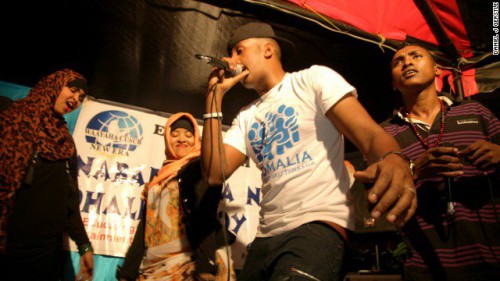Freedom of Speech Roundup
by Sampsonia Way / April 6, 2013 / No comments
In the weekly Freedom of Speech Roundup, Sampsonia Way presents some of the week’s top news on freedom of expression, journalists in danger, artists in exile, and banned literature.

The exiled Somali Hip Hop group Waayaha Cusub will soon headline the Mogadishu Music Festival in Somalia. Photo: Waayah Cusub via Facebook.
Somali Rappers Defy Bullets, Death Threats For Mogadishu Concert
CNN. Waayaha Cusub, a Kenya-based hip-hop group of Somali refugee musicians, will perform at the Mogadishu Music Festival despite numerous death threats. The group has faced criticism for lyrics that attack Somali warlords, but through this tour they hope to “pass on the message to stop the killing.” Read here.
Mocking Morsi: How Funny Is Too Funny In Egypt?
Global Post. Known as the Jon Stewart of Egypt, comedian Bassem Yousef was recently arrested for insulting Islam and President Mohammed Morsi. Yousef defended his words by saying that his criticism is a crucial part of freedom of thought and expression. U.S. comedian Jon Stewart recently defended Youssef on his program, The Daily Show. Read here.
Yoani Sanchez Seeks To Unite Castro’s Cuba With Miami’s Cuba
NPR. Cuban blogger Yoani Sanchez spoke in Miami across from the Freedom Tower on Monday, but was met by protesters who criticized her support of lifting the U.S. embargo on Cuba. Still, hundreds attended Sanchez’s speech and treated her like ‘rock star’ for her use of social media to encourage democracy in Cuba. Read here.
Egypt in The Raw
New York Review of Books. Egyptian writer Sonallah Ibrahim was imprisoned and censored for writing about the affects of totalitarianism in Egypt throughout the 1960s. Ibrahim self-published his first novel, That Smell, in 1966 via a small Cairo printing press. Now, a new edition of the novel has been translated into English, and includes diary entries written during his time in prison. Read here.
South African Punk Band National Wake
PRI’s The World. In this interview Ivan Kadey, the only living member of 1970s South African punk band National Wake, speaks about the band’s history, the mixed-race group’s fight against apartheid, and their break-up following the release of their only album in 1981, which was banned by the government. Listen here.
“International News” (1981) by National Wake addresses media censorship and international news coverage in South Africa, following the 1976 Soweto Uprising. Video: Ivan Kadey via YouTube
Kenya: Reporter Found Dead, Journalists Defend Election Coverage
CPJ. Bernard Wesonga, a correspondent for daily newspaper The Star, was killed after receiving anonymous threats via text message as a result of his investigation of unlawful sale of expired fertilizer. Wesonga is one of many slain Kenyan journalists whose deaths have not yielded arrests. Read here.
All Africa. Kenyan journalists are being criticized for their coverage of the recent election; many press freedom activists accuse them of writing to avoid inciting tensions and failing to scrutinize problematic court rulings. Kenyan journalists say that it’s not the media’s job to follow up on claims not backed by solid evidence. Read here.
Drop The I-Word: In Victory For Advocates, Associated Press Stops Using Phrase “Illegal Immigrant”
Democracy Now! The Associated Press has dropped the phrase ‘illegal immigrant’ from the stylebook that guides journalists and editors. The change was encouraged by Rinku Sen, President of the Applied Research Center, who created the “Drop The I-Word” Campaign in 2010 to discourage the term ‘illegals’ being used in public discourse. Read here.
Russians Selectively Blocking Internet
The New York Times. The Russian government has censored parts of YouTube, Facebook, and Twitter under a law that gives them the power to block online content they deem illegal or harmful to children. Ostensibly the law controls child pornography and content that promotes drug use, but critics warn it will open up broader Internet censorship. Read here.
On Its 7th Birthday, Is Twitter Still The ‘Free Speech Party’?
NPR. Twitter has been a useful tool in countries where free speech is limited, but despite the company’s promise to comply with the laws in each country they operate, many countries have sued Twitter for not releasing information concerning activists. Many wonder if Twitter can keep up its free speech values in the future. Read here.
Why Are Zimbabwe Police Seizing Radios?
BBC. A non-government youth association has been giving Zimbabwean villagers solar powered, wind-up radios. However, police have confiscated many of them in recent raids, saying that the radios are used to spread propaganda and hate speech. Read here.




